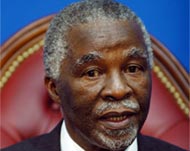Apartheid victim exhumations begin
South African investigators have begun exhumations in a bid to find the remains of anti-apartheid activists who were killed during the years of white rule.

Relatives of two missing anti-apartheid fighters broke down in sobs on Wednesday as investigators working with brushes and trowels slowly uncovered two skeletons from the dark red earth.
The exhumations are the first of what could be hundreds as South Africa seeks to close a chapter in its blood-soaked history.
Relatives of Aubrey Jabulani Ndaba and Oscar Maleka had given up hope of ever finding their remains until investigators contacted them late last year to say they believed their unmarked graves were located outside the KwaZulu-Natal city of Pietermaritzburg.
The two men were the first of 477 missing people that the National Prosecuting Authority was able to trace two years after being handed the apartheid-era cases by President Thabo Mbeki.
The Truth and Reconciliation Commission, formed to investigate crimes under apartheid and active from 1995 to 2003, had been unable to solve the mysteries of their deaths.
Bloody history
National Prosecuting Authority Director Vusi Pikoli pledged on Wednesday to find the others.
“This is the beginning of the process that will be able to restore the dignity … of those fighters for liberation who perished in the course of the struggle,” he told relatives, anti-apartheid struggle veterans, government officials and area residents.
|
“This is the beginning of the process that will be able to restore the dignity … of those fighters for liberation who perished in the course of the struggle” Vusi Pikoli, |
“We want to close this chapter of our history in South Africa.”
Hundreds of people vanished as South Africa‘s former white rulers enforced their racist rule through abductions, torture and killings.
Others died in clashes between apartheid security forces and those seeking to overthrow the repressive regime.
Investigators used evidence presented to the Truth Commission and their own research to trace what is believed to be the final resting place of Ndaba and Maleka, if not all the details of how they died.
ANC fighter
Investigators said that Ndaba, from the Pietermaritzburg area, and Maleka, from Soweto, were working for the armed wing of the now governing African National Congress when they died in a firefight with security forces on 13 April 1988.
The nature of their mission is unclear, nor is it clear exactly where they died.
 |
|
Thabo Mbeki says there must be |
Officials said security forces typically buried guerrillas killed in such clashes in paupers’ graves.
“From here we are going to arrange the day of burying him properly,” Ndaba’s sister, Margaret Joe Ndaba, 68, said as she watched a team of forensic anthropologists from Argentina carefully clear the soil from the skeletons at the bottom of two gaping holes. DNA testing was to be done to confirm the identities.
“What I’m glad about is that my brother is going to be buried like every other person,” Margaret Joe Ndaba said, adding her brother did “a wonderful thing” by dying for his country.
Ndaba left South Africa during a watershed student uprising in 1976 to join ANC guerrillas, but periodically made unannounced, usually brief, visits to his family.
Political violence
Then without explanation, the visits stopped. The family spent years trying to find out what happened to him. “It was misery,” Margaret Joe Ndbaba said, fighting back tears.
Maleka also joined ANC guerrillas in 1976. His mother, Joyce Sakoko Maleka, said police raids on her Soweto home were usually an indication he was back in the country on a mission.
|
“What I’m glad about is that my brother is going to be buried like every other person” Margaret Joe Ndaba,Anti-apartheid fighter’s relative |
“They came at night, kicked the doors, ransacked the house. But after these children died, we never saw these police again,” she said.
Years later, a friend brought word that Maleka had died.
While prosecutors have been tasked with bringing charges against perpetrators of political violence who did not seek amnesty from the truth commission, officials said it is unlikely prosecutions will result from the deaths of Maleka and Ndaba.
But Joyce Sakoko Maleka said she would like to see someone punished.
“They are people. They are not dogs,” she said. “It is somebody’s child.”